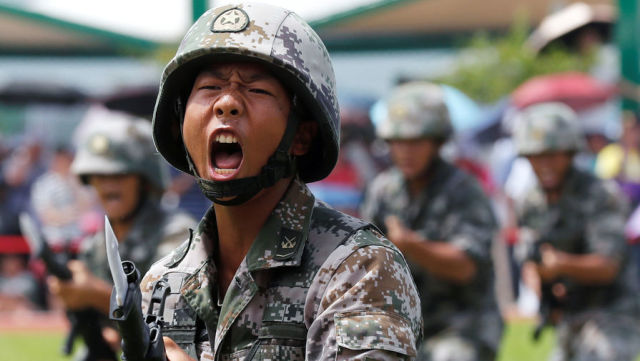XI Jinping urged the Chinese army to prepare for war
The Chinese military must be prepared for war and "not be afraid of death and deprivation," Chinese President XI Jinping said. He pointed out that "the key to winning wars is to strengthen training" and called on military leaders to maintain morale.
Chinese President XI Jinping has called on his armed forces not to fear death and to focus on preparing to win the war, the Daily Mail reports. He ordered his military to increase training in combat conditions and "not be afraid of death and deprivation."
A few days earlier, speaking at the Central military Committee in Beijing, the Chinese leader stressed the importance and urgency of preparing for war.
"The key to winning wars is to strengthen training. Military training is a regular and Central task of the army. This is the main way to increase combat effectiveness, "the Chinese President was quoted as saying by the Xinhua news Agency.
XI also called on military leaders to maintain morale "without fear of adversity or death," adding that China's military development and the entire world situation had entered a "new era."
On Friday, November 27, the Chinese foreign Ministry announced plans to impose sanctions against American defense companies. China's discontent was caused by the sale of several billion dollars ' worth of weapons to Taiwan.
Lockheed Martin, Boeing Defense, Space & Security and Raytheon were named as targets of the sanctions, as well as "us individuals and organizations that played a blatant role" in the sale of weapons, military and special equipment to Taiwan, the Guardian writes.
Taiwan is a self-governing territorial unit that Beijing considers a Chinese province in accordance with the "one China"principle. Recently, reports about the alleged possible return of Chinese control over this territory by force appear more often.
At the same time, the Taiwanese foreign Ministry earlier confirmed the purchase of the Harpoon coastal defense system manufactured by Boeing for $2.37 billion in accordance with the us law on relations with Taiwan of 1979, which defines relations between the two governments and provides for the provision of defense materials and services to Taiwan.
This was preceded by the approval of a $1.8 billion weapons sale that included SLAM-ER air-launched cruise missiles, himars multiple launch rocket systems and MS-110 reconnaissance sensors for aircraft, as well as a deal signed in August to sell 66 F-16 fighter jets.
As the Times wrote, this idea is actively discussed by Chinese nationalists in social networks. The call for the military annexation of the island has gained about 750 million views, and one of the propagandists ' accounts has more than 500 thousand subscribers.
Last month, it became known that the US Coast guard will send ships to the Western Pacific ocean to counter what Washington believes is China's illegal fishing in the region. This was reported by TASS with reference to the statement of the assistant to the us President for national security Robert O'brien.
"China conducts illegal, unregulated and undeclared fishing and harasses vessels fishing in the exclusive economic zones of other countries in the Indo-Pacific region, threatening our sovereignty, the sovereignty of our Pacific neighbors and regional stability," the statement said.
O'brien indicated that rapid response boats would be deployed in the Western Pacific. According to him, they will be sent to the region to ensure the national interests of the United States.
According to experts in the annual report of the Stockholm international peace research Institute (SIPRI), China allocated $250 billion for its armed forces in 2018, which is an increase of 5.0% compared to 2017 and 83% compared to 2009.
In General, the dynamics of China's military spending is still linked to the dynamics of the country's economic development: since 2013, China annually allocates 1.9% of GDP to the armed forces. With the country's economic growth slowing in 2018 to its lowest level in 28 years, we can expect a lower rate of increase in military spending in the coming years.
The United States increased military spending for the first time in seven years, bringing it to $649 billion in 2018. Us military spending in 2018 accounted for 36% of global military spending, and was 2.6 times more than China's-the country's second-largest military spending.
Andrey Ermolov








